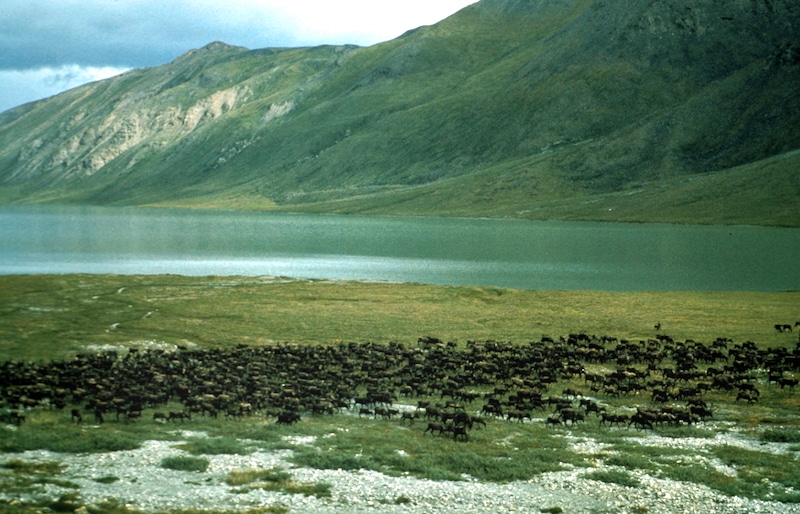This post was originally published on Eco Watch
The approval of plans for an oil and gas lease sale in Alaska’s Arctic National Wildlife Refuge by the outgoing Biden administration on Monday will keep the door open for drilling in the pristine wildlands.
The sale, to be held on January 9, will include a smaller portion of the total land that was made available for bidding about four years ago during the Trump administration, reported The Associated Press.
“Drilling for oil in the Arctic National Wildlife Refuge is all risk with no reward,” said attorney for Earthjustice Erik Grafe, who has been a leader in litigation to protect the wildlife refuge, in a press release from Earthjustice. “Oil drilling would destroy this beautiful land, held sacred by Gwich’in people, and would further destabilize the global climate, but it offers zero benefit to taxpayers or consumers.”
In his promise to expand oil and gas drilling in the United States, President-elect Donald Trump referenced a law passed in 2017 that enabled the announcement.
The 2017 Tax Cut and Jobs Act — passed during Trump’s first term as president — included a requirement that two lease sales in the Arctic Refuge be held by the U.S. Department of the Interior before the end of this year, the press release said. The sale just approved by the Biden administration will be the second.
The first was held in 2021 by the Trump administration and generated just one percent of the estimated revenue promised to U.S. taxpayers when the leasing mandate was approved by Congress.
“Few oil companies bid, since banks and insurance companies wary of the high risk refused to back drilling programs there. Although the volume of recoverable oil in the Refuge is unknown, climate scientists have warned for decades that extracting and burning any amount of oil will accelerate climate change consequences such as droughts, heat waves, wildfires and extreme storm events,” Earthjustice said. “Pumping oil from the Arctic Refuge won’t result in lower oil prices, according to the federal Energy Information Administration, and building the necessary infrastructure would take decades.”
After a review of the leasing program by the Biden administration, seven leases made during the first sale were canceled, The Associated Press reported. Litigation around the cancellation is still pending.
The first lease sale is still being delayed by ongoing lawsuits, with environmentalists promising to bring them to court in order to stop drilling in the refuge.
“Congress should restore protections for the coastal plain rather than continue allowing these lands to be used as a political pawn,” said Brook Brisson, Trustees for Alaska senior staff attorney, as reported by the Anchorage Daily News. “We will stand with our clients, partners, and the majority of Americans in opposing the leasing of these lands and if that means challenging unlawful decisions in court, we’re prepared to do that again.”
The U.S. Bureau of Land Management (BLM) said a formal decision to approve the lease sale has been issued for the refuge’s 1.6-million-acre coastal plain. The coastal plain is a vast wildlife refuge bordering the Beaufort Sea. The refuge is the habitat of caribou, polar bears, musk oxen and an array of bird species. The debate about whether to make the coastal plain available for oil drilling has been going on for decades.
Business groups, North Slope leaders and Alaska state politicians have been hoping for oil exploration in the delicately balanced ecosystem of the refuge. However, they complained that the amount of land being offered for lease — the minimum permitted by law — was not enough and could hamper bidding.
Some of the state’s political leaders have also expressed frustration with constraints on the planned lease sale. President of advocacy group Voice of the Arctic Iñupiat Nagruk Harcharek referred to the lease sale as “a deliberate attempt by the Biden administration’s Interior Department to kneecap the potential of development” in the wildlife refuge, as The Associated Press reported.
Some Alaska Tribes and conservation groups criticized the decision as having the potential to ramp up global heating if it means oil production in the region, while also putting caribou and other wildlife species at risk.

RaeAnn Garnett, Tribal government first chief of the Native Village of Venetie, said drilling in the refuge would amount to a “direct threat” to the Porcupine caribou herd and the Neets’ajj Gwich’in way of life.
“Our people have relied on this herd for our subsistence practices since time immemorial and expect to be able to rely on it for generations to come,” Garnett said, as reported by the Anchorage Daily News. “Any oil and gas development poses an undeniable threat to the caribou migration routes, which will impact our traditional subsistence-based way of life.”

According to the BLM, plans for potential development or exploration made after any oil leases are issued for the refuge would be subject to environmental review, The Associated Press reported.
“We’re committed to going to court as often as necessary to defend the Arctic Refuge from oil drilling and will work toward a more sustainable future that does not depend on ever-expanding oil extraction,” Grafe said in the press release.
The post ‘All Risk With No Reward’: Outgoing Biden Admin Approves Oil and Gas Lease Sale in Alaska’s Pristine Arctic Wildlife Refuge appeared first on EcoWatch.





0 Comments